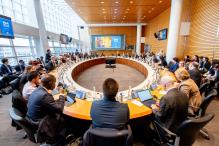A new policy brief developed by UNU-CPR and the Finance Against Slavery and Trafficking (FAST) initiative identifies steps financial institutions can take to prepare for and address modern slavery and human trafficking (MS/HT) risks in crisis situations.
Increased vulnerability during crises can expose people to exploitation by criminal actors, often resulting in a rapid increase in trafficking and/or exploitation activities. For financial institutions, a crisis-driven increase in MS/HT raises the risk that they will become inadvertently involved in associated criminal activities via the banking services they provide.
A recent example is the war in Ukraine and the resulting refugee flows to safe countries. As of early February 2023, more than 8 million people who fled Ukraine – mostly women and children – have been registered in other European countries. But, despite their increased risk of falling victim to MS/HT, conversations between the FAST Initiative and members of the financial sector suggest that most institutions were not prepared to identify and mitigate the related risks in a timely way.
In response, the policy brief, Establishing an Agile Response to Crisis and Conflict-related Modern Slavery and Human Trafficking Risks, recommends appropriate control and risk mitigation measures and steps that will not only help reduce any immediate risk of a financial institution becoming involved in the financing of MS/HT, but also ensure such activities can be identified, investigated, and possibly deterred, by relevant authorities at an early stage.
Key recommendations include:
- Monitor ongoing and emerging crises – through automated keyword searches and analyses of media articles and information disseminated by organizations specialized in crisis forecasting.
- Assess whether a crisis is likely to impact on a financial institution’s business. For example, examine client and correspondent bank relationships with the country in crisis.
- Assess whether a crisis is likely to increase MS/HT and to what extent. For example, assess levels of displacement, the economic needs of the affected population, and the extent to which families are separated and children are deprived of parental care.
- Identify specific MS/HT risks – related to pre-existing vulnerabilities, for instance, and whether men or women and children have mostly been displaced.
- Adopt risk-mitigating measures – including ‘Know Your Customer (KYC)’ due diligence and transaction monitoring.
- Continuously monitor new information – to stay informed of new developments and make informed decisions to mitigate the impacts of a crisis.
Read Establishing an Agile Response Process to Crisis and Conflict-related Modern Slavery and Human Trafficking Risks here.


